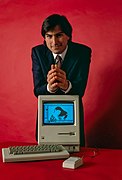Portal:Internet
The Internet PortalThe Internet (or internet) is the global system of interconnected computer networks that uses the Internet protocol suite (TCP/IP) to communicate between networks and devices. It is a network of networks that consists of private, public, academic, business, and government networks of local to global scope, linked by a broad array of electronic, wireless, and optical networking technologies. The Internet carries a vast range of information resources and services, such as the interlinked hypertext documents and applications of the World Wide Web (WWW), electronic mail, telephony, and file sharing. The origins of the Internet date back to research to enable time-sharing of computer resources and the development of packet switching in the 1960s. The set of rules (communication protocols) to enable internetworking on the Internet arose from research and development commissioned in the 1970s by the Defense Advanced Research Projects Agency (DARPA) of the United States Department of Defense in collaboration with universities and researchers across the United States and in the United Kingdom and France. The ARPANET initially served as a backbone for the interconnection of regional academic and military networks in the United States to enable resource sharing. The funding of the National Science Foundation Network as a new backbone in the 1980s, as well as private funding for other commercial extensions, encouraged worldwide participation in the development of new networking technologies and the merger of many networks using DARPA's Internet protocol suite. The linking of commercial networks and enterprises by the early 1990s, as well as the advent of the World Wide Web, marked the beginning of the transition to the modern Internet, and generated a sustained exponential growth as generations of institutional, personal, and mobile computers were connected to the network. Although the Internet was widely used by academia in the 1980s, the subsequent commercialization in the 1990s and beyond incorporated its services and technologies into virtually every aspect of modern life. (Full article...) Selected articleFactitious disorder imposed on self, also known as Munchausen syndrome, is a factitious disorder in which those affected feign or induce disease, illness, injury, abuse, or psychological trauma to draw attention, sympathy, or reassurance to themselves. Munchausen syndrome fits within the subclass of factitious disorder with predominantly physical signs and symptoms, but patients also have a history of recurrent hospitalization, travelling, and dramatic, extremely improbable tales of their past experiences. The term Munchausen syndrome derives its name from the fictional character Baron Munchausen. Factitious disorder imposed on self is related to factitious disorder imposed on another, which refers to the abuse of another person, typically a child, in order to seek attention or sympathy for the abuser. This is considered “Munchausen by proxy” and the drive to create symptoms for the victim can result in unnecessary and costly diagnostic or corrective procedures. (Full article...) Selected picture Jay Maynard is a computer programmer and system administrator. He is most famous for his electroluminiscent Tron Guy costume. He became an Internet phenomenon when his costume inspired by the movie Tron spread across the net from postings on Slashdot and Fark. News
Wikinews Internet portal
WikiProjects
Did you know (auto-generated) -
Selected biography
Mark Elliot Zuckerberg (born May 14, 1984) is an American computer programmer and entrepreneur. As a Harvard College student he founded the online social networking service Facebook with the help of fellow Harvard student and computer science major Andrew McCollum as well as roommates Dustin Moskovitz and Chris Hughes. He now serves as Facebook's CEO. Zuckerberg launched Facebook from his Harvard dorm room on February 4, 2004. It quickly became a success at Harvard and more than two-thirds of the school's students signed up in the first two weeks. Zuckerberg then decided to spread Facebook to other schools and enlisted the help of roommate Dustin Moskovitz. They first spread it to Stanford, Columbia and Yale and then to other Ivy League colleges and schools in the Boston area. By the beginning of the summer, Zuckerberg and Moskovitz had released Facebook at almost 30 schools. Zuckerberg moved to Palo Alto, California with Moskovitz and some friends during the summer of 2004. They leased a small house which served as their first office. Over the summer, Zuckerberg met Peter Thiel who invested in the company. Today, the company has four buildings in downtown Palo Alto.
General images -The following are images from various internet-related articles on Wikipedia.
Selected quoteMore Did you know...
Main topics
Featured contentCategoriesRelated portalsThings you can do
Associated WikimediaThe following Wikimedia Foundation sister projects provide more on this subject:
Wikipedia's portals |





















































